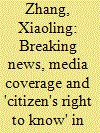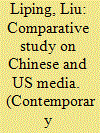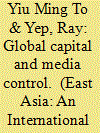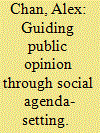| Srl | Item |
| 1 |
ID:
080491


|
|
|
|
|
| Publication |
2007.
|
| Summary/Abstract |
This study examines the Chinese media's coverage of the Iraq War and SARS in 2003, that of CCTV in particular, and discusses the 'citizen's right to know' which became popularised in China during these two breaking news events. After delineating the moves that CCTV has been making, the paper argues that in the face of globalisation of information the party-state is actively involved in pursuit of image reconstruction both at home and internationally, and of having a voice in the new world order. Findings show that although the Chinese media do not lack the capacity to honor the 'citizen's right to know', the coverage of breaking news is determined by the state's perception of a given situation.
|
|
|
|
|
|
|
|
|
|
|
|
|
|
|
|
| 2 |
ID:
096084


|
|
|
|
|
| Publication |
2010.
|
| Summary/Abstract |
China and the United States are tow countries with quite different histories, philosophies, values and political systems and because of these difference, the two countries have two quite different media. the most notable or maybe the most fundamental difference lies in the relationships of these tow media with their respective governments. The Chinese medium is often a part of the government and the US medium is basically preventively owned. This makes them almost two different things, like an apple and an orange. In most of the case, one can not use one as the standard to criticize the other and vice versa.
|
|
|
|
|
|
|
|
|
|
|
|
|
|
|
|
| 3 |
ID:
085029


|
|
|
| 4 |
ID:
080492


|
|
|
|
|
| Publication |
2007.
|
| Summary/Abstract |
Guidance of public opinion (yulun daoxiang) became the buzzword of the Chinese government's media policy from the 1990s. I illustrate this idea through borrowing the concept of agenda-setting from media studies. Partly, its introduction was a response to the crisis of the propaganda model in the mid-1980s. Recognizing its declining ability to control what people think, the party state shifted its focus from political ideology to social agenda. The guidance of public opinion is indirect, flexible and subtle in nature. It allows the state-controlled media to address people's daily concerns. Also, it realizes that responsiveness to public opinion is the key to guiding that opinion effectively. The media need to guide public opinion 'correctly', so as to promote political unity, social stability, and boost morale. An argument is advanced that the party state seeks to accomplish attention management through agenda-setting
|
|
|
|
|
|
|
|
|
|
|
|
|
|
|
|
| 5 |
ID:
077803


|
|
|
| 6 |
ID:
077173


|
|
|
| 7 |
ID:
077176


|
|
|
|
|
| Publication |
2007.
|
| Summary/Abstract |
This article examines media publicity surrounding the case of Li Ning-a 34-year-old native of Nanjing City, Jiangsu Province, who made legal history in the People's Republic of China (PRC) on 17 October 2004 when he was sentenced to eight years jail and fined 60,000 yuan for organizing male-male prostitution services in a recreational business enterprise. Reportedly the first conviction of its kind, the case proved to be controversial for three reasons. First, it prompted legal debate over the nature of China's recent shift to a "rule of law" and associated conceptions of due legal process and individual and sexual rights. Second, it intimated that homosocial prostitution-male-male prostitution in which neither participant may self-identify as homosexual - is an integral but frequently neglected component of China's burgeoning, albeit banned, sex industry. Finally, it raised questions regarding the perceived appropriate parameters of same-sex sexual conduct in a country facing rapidly increasing rates of HIV/AIDS infection. An examination of media coverage of these concerns suggests that accusations of official homophobia in the PRC are overstated: they elide the specificity of debates on homosexuality in present-day China due to their overarching concern with Western understandings of sexuality as constitutive of selfhood and (rightful) sociopolitical identity
|
|
|
|
|
|
|
|
|
|
|
|
|
|
|
|